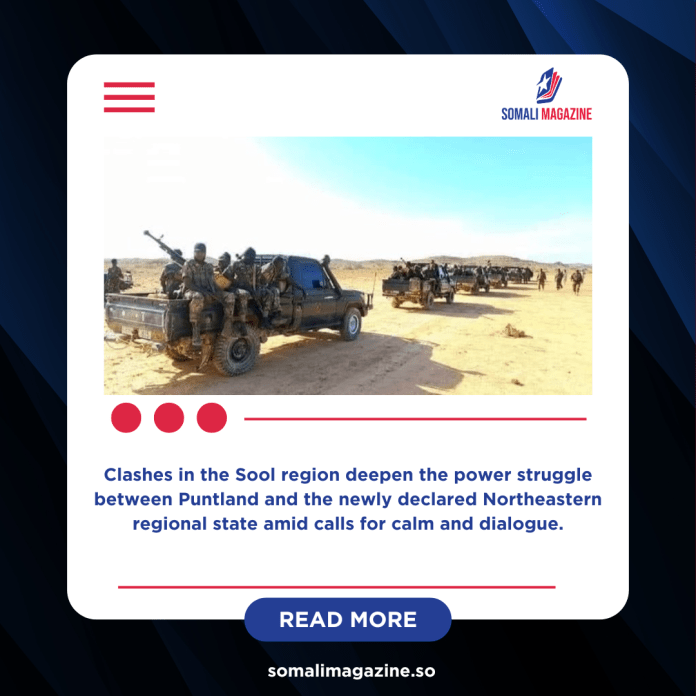Facebook Twitter (X) Instagram Somali Magazine - People's Magazine
Tensions between Puntland and the newly formed Northeastern regional state have flared again after clashes were reported in Boocame district, located in Somalia’s Sool region. The Northeastern administration accused Puntland authorities of launching an armed attack on Boocame on Friday afternoon, claiming that several people were injured in the fighting.
In a statement released Friday evening, officials from the Northeastern regional state said that forces loyal to Puntland’s leadership initiated the assault, describing it as an unprovoked act meant to destabilize the area. The administration condemned the attack, warning that such actions could worsen insecurity and deepen divisions between the two neighboring entities.
Boocame District Commissioner Mahdi Rashaad also confirmed the fighting and accused Puntland of trying to “create insecurity and chaos” in the town. According to Rashaad, the attack disrupted normal life and heightened fears among residents, who are already anxious due to the growing political tension in the region.
Puntland authorities have not yet released an official response to the accusations, leaving many in the region uncertain about the next steps or whether further clashes could erupt. However, this is not the first time Boocame has become a flashpoint in the political and territorial dispute between the two administrations.
Boocame, situated roughly 70 kilometers east of Garowe, holds both strategic and symbolic importance. It is the hometown of Puntland’s Vice President Ilyas Lugatoor, who has firmly maintained that the district remains under Puntland’s control. On the other hand, leaders of the newly declared Northeastern regional state insist that Boocame is part of their jurisdiction, adding to the ongoing power struggle.
The dispute over Boocame has deeper political roots. During Somalia’s preparations for one-person, one-vote elections in the northern regions, Puntland authorities reportedly blocked voter registration efforts in the town. That move was widely seen as an attempt to reinforce their influence and prevent the federal government or rival local administrations from gaining a foothold in the area.
This latest confrontation highlights how fragile northern Somalia’s political environment has become. The emergence of the Northeastern regional state — which claims to represent communities dissatisfied with Puntland’s leadership — has created new divisions and competing claims of authority. While Puntland remains one of Somalia’s most established federal states, its dominance is now being challenged by groups seeking greater autonomy and representation.
Analysts say that unless dialogue is initiated between the rival administrations, the standoff could escalate into more serious conflict. Local elders and peace activists have already called for restraint, urging both sides to prioritize negotiations over violence. They warn that continued clashes could undermine stability across the Sool and Cayn regions, where loyalties are divided and tensions are already high.
For residents of Boocame, the fear of renewed violence looms large. Many locals are caught between rival forces and political claims, uncertain about who actually governs their town. The growing militarization of the area has also disrupted daily life, with reports of families fleeing temporarily to safer areas.
The situation in Boocame reflects a broader trend in Somalia’s northern regions — a struggle for political legitimacy and control at a time when the country is attempting to strengthen its federal system. Without clear boundaries and mutual recognition between regional administrations, disputes like this one are likely to continue fueling instability and mistrust.
As of Friday evening, calm had reportedly returned to Boocame, though tensions remain high. Both Puntland and the Northeastern regional state face mounting pressure to ease hostilities and engage in dialogue to prevent further escalation.

